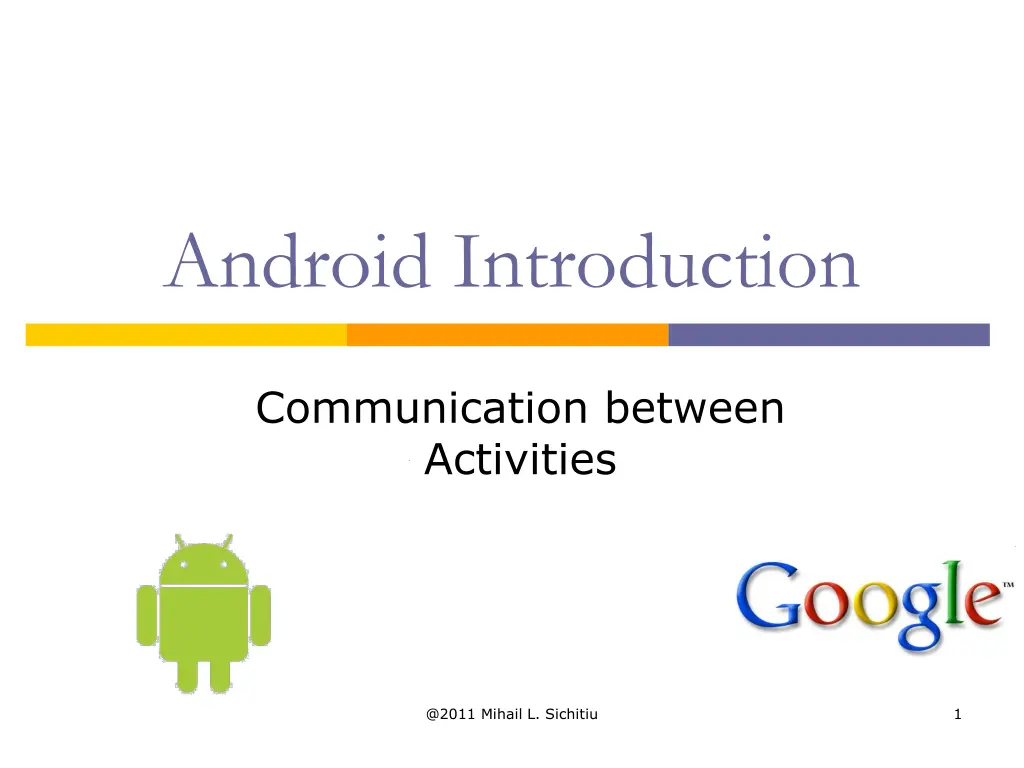
Android Activities Communication Methods
Learn how to enable communication between activities in Android apps using message return and static variable methods. Create sub-activities, invoke them from the main activity, and handle return results effectively.
Download Presentation

Please find below an Image/Link to download the presentation.
The content on the website is provided AS IS for your information and personal use only. It may not be sold, licensed, or shared on other websites without obtaining consent from the author. If you encounter any issues during the download, it is possible that the publisher has removed the file from their server.
You are allowed to download the files provided on this website for personal or commercial use, subject to the condition that they are used lawfully. All files are the property of their respective owners.
The content on the website is provided AS IS for your information and personal use only. It may not be sold, licensed, or shared on other websites without obtaining consent from the author.
E N D
Presentation Transcript
Android Introduction Communication between Activities @2011 Mihail L. Sichitiu 1
Goal Create an application that has 3 Activities: a main activity and two sub-activities Introduce two different methods for inter-activity communication: message return and static variable <via static valuables> Invoke Activity <via message> Invoke Activity Read from the shared space Return result Change values in shared space 2 Shared valuables <Main Activity> @2011 Mihail L. Sichitiu
Overview Create two new sub-activities (in addition to the main activity) Create the two classes (.java) Create the two layouts (.xml) Invoke the two new sub-activities Have the sub-activities return results Read the results of the sub-activities from the main activity @2011 Mihail L. Sichitiu 3
Create the new sub-activities File > New > Class Copy & Paste the OnCreate() from the main activity change the layout Copy & Paste the main.xml to two new layouts Change all three layouts @2011 Mihail L. Sichitiu 4
Invoke Sub-activities from the Main Activity Name of your main activity class private static final int INTENT_GET_MSG = 1; @Override public void onCreate(Bundle savedInstanceState) { super.onCreate(savedInstanceState); setContentView(R.layout.main); staticMsgTextView = (TextView)findViewById(R.id.textViewStaticMsg); invokeButton = (Button)findViewById(R.id.invokeButton); invokeButton.setOnClickListener(new OnClickListener() { public void onClick(View v) { Intent msgActivityIntent = new Intent(ActivityInteractionActivity.this, AdditionalActivity.class); startActivityForResult(msgActivityIntent, INTENT_GET_MSG); } }); invokeStaticButton = (Button)findViewById(R.id.invokeStaticButton); invokeStaticButton.setOnClickListener(new OnClickListener() { public void onClick(View v) { Intent staticActivityIntent = new Intent(ActivityInteractionActivity.this, StaticMsgActivity.class); startActivity(staticActivityIntent); } }); } for interaction via message return for interaction via static valuables @2011 Mihail L. Sichitiu 5
Interaction via message return - Invoke button clicked ! - startActivityForResult(msgActivityIntent, INTENT_GET_MSG); - OK button clicked ! - Intent intent = new Intent(); - intent.putExtra(RETURN_MSG, msg); - setResult(Activity.RESULT_OK, intent); - finish(); Build an intent to return the result message public void onActivityResult() { : case INTENT_GET_MSG: String returnMsg = data.getExtras() .getString(AdditionalActivity.RETURN_MSG); : } Receive the message <Main Activity> <Sub Activity> @2011 Mihail L. Sichitiu 6
Interaction via message return Sub-activity for message return When ok button clicked, return to the main Activity with result message via intent. public Static String RETURN_MSG = return_msg ; @Override public void onCreate(Bundle savedInstanceState) { : okButton.setOnClickListener(new OnClickListener() { public void onClick(View v) { String msg = editText.getText().toString(); Intent intent = new Intent(); intent.putExtra(RETURN_MSG, msg); // Set result and finish this Activity setResult(Activity.RESULT_OK, intent); // The ActivityResult is propagated back to main activity // via onActivityResult(). finish(); } }); } @2011 Mihail L. Sichitiu 7
Interaction via message return Main Activity can receive the result message from sub- activity by overriding onActivityResult() @Override public void onActivityResult(int requestCode, int resultCode, Intent data) { switch (requestCode) { case INTENT_GET_MSG: if (resultCode == Activity.RESULT_OK ) { String returnMsg = data.getExtras() .getString(AdditionalActivity.RETURN_MSG); Toast.makeText(this, returnMsg , Toast.LENGTH_SHORT).show(); } else { Toast.makeText(this, "Error !! ", Toast.LENGTH_SHORT).show(); } break; }// end switch } @2011 Mihail L. Sichitiu 8
Interaction via static variables - Invoke button clicked ! - startActivity(staticActivityIntent); - OK button clicked ! - StaticStorage.msg = msg; Save result in a static variable staticMsgTextView.setText(StaticStorage.msg ); Read the static variable <Main Activity> <Sub Activity> @2011 Mihail L. Sichitiu 9
Interaction via static variables By defining a public static variable, both Activities can share the static variables. Create a new class we call StaticStorage (File>New>Class) same package as the other java files. package ncsu.summer.android; public class StaticStorage { public static String msg = null; } @2011 Mihail L. Sichitiu 10
Interaction via static variables Sub-activity using static variables When ok button clicked, save the result message in the static variable(s) shared between Activities. @Override public void onCreate(Bundle savedInstanceState) { super.onCreate(savedInstanceState); setContentView(R.layout.static_msg_activity); editText = (EditText)findViewById(R.id.editText); okButton = (Button)findViewById(R.id.okButton); okButton.setOnClickListener(new OnClickListener() { public void onClick(View v) { String msg = editText.getText().toString(); StaticStorage.msg = msg; // Save result in a static variable finish(); } }); } @2011 Mihail L. Sichitiu 11
Interaction via static variables Main Activity access the static variable in onResume() @Override public void onResume() { super.onResume(); if( StaticStorage.msg != null && staticMsgTextView != null){ staticMsgTextView.setText( StaticStorage.msg ); } } @2011 Mihail L. Sichitiu 12
AndroidManifest.xml Add two sub-activities in AndroidManifest.xml <activity android:name=".AdditionalActivity" android:label="@string/app_additional_activity"> </activity> <activity android:name=".StaticMsgActivity" android:label="@string/app_static_msg_activity"> </activity> @2011 Mihail L. Sichitiu 13
strings.xml Add activity names used in AndroidManifest.xml <string name="app_additional_activity">Additional Activity</string> <string name="app_static_msg_activity">Static Msg Activity</string> @2011 Mihail L. Sichitiu 14
